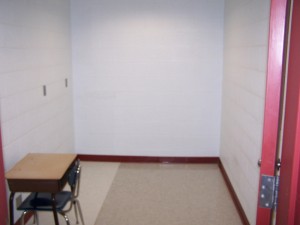Here is a follow up on the “Scream Rooms” that are being used in Connecticut public schools.
By KATHLEEN MEGAN, kmegan@courant.com The Hartford Courant
Experts Call ‘Scream Rooms’ Untherapeutic, Harmful To Children And Others At School – State Broadening Its Investigation In Middletown; Civil Rights Complaint Filed
Please click to view news video.
Every morning Michael Sexton hears the same thing from his 8-year-old son: “Daddy, I don’t want to go to school. Daddy, I don’t want to go.”
Sexton says it’s because his son, Robert, spent too much time alone in a small room — sometimes called a scream room, a timeout room or a safe room — as a way to control his behavior at a public school run by Area Cooperative Regional Education Services in North Haven.
Sexton heard about the outcry in Middletown last week when parents learned that children with troublesome behaviors at Farm Hill School were put into a 10-by-6-foot room with a window on the door — as a place to calm down.
Sexton said he was glad to hear that people were speaking out against the use of these rooms.
“It’s like torture for kids,” said Sexton, who lives in New Britain. “That’s like sitting in jail, sitting behind bars. It’s not good for them.”
Many national and state advocates for children agree, and say that “scream rooms” or seclusion rooms should be banned, calling them untherapeutic and harmful to children and to the school community.
“We think it’s an absolutely horrific practice that has no basis in research,” said Denise Marshall, executive director of the Council of Parents, Attorneys and Advocates in Towson, Md. “It’s extremely traumatic to everyone. … We have had situations where students have died in this type of room.”
Jane Hudson, a senior staff attorney with the National Disability Rights Network in Washington, said there was no evidence that secluding a child had any therapeutic value.
“These are archaic methods to control behavior and to try to keep people safe,” she said. “Can you imagine how frightening this is for a 6-year-old? Of course, they are going to react, that’s why the screaming occurs: ‘Get me out of here!'”
Hudson said it was far better to provide “lots of training for staff about how to de-escalate children and positive behavior intervention. … Schools are behind the curve in getting the appropriate training.”
In Connecticut, a group of attorneys and advocates for children with disabilities filed a complaint Friday with the Office for Civil Rights of the U.S. Department of Education, charging that the practice of using the seclusion room chiefly or exclusively for children with special needs at Farm Hill School violates their civil rights.
U.S. Sen. Thomas Harkin, D-Iowa, has introduced legislation that would ban the use of seclusion rooms for children in schools.
“I think Connecticut needs to know that this is an issue the whole country has been grappling with,” said Mary Beth Bruder, director of the A.J. Pappanikou Center for Excellence in Developmental Disabilities at the University of Connecticut Health Center, “and the whole country is moving toward banning seclusion and restraint.”
Law Requires Monitoring And Parental Notification
In Connecticut, the use of seclusion rooms is allowed under a 2007 law for students with disabilities “as specified in an Individualized Education Program (IEP) … as determined by a team of professionals that includes parents of the child.”
The law goes on to provide information about how and when a child can be secluded and calls for frequent monitoring and notification of parents when a child has been in a seclusion room.
The outrage in Middletown erupted when parents said they witnessed two school staff members holding a door shut on a “scream room” while a child inside kicked and screamed uncontrollably. A meeting was held last week at which parents said that their children were distracted and intimidated by the screaming, and at least one child said that it was “scary” and made it hard to concentrate on her work.
“This is a classic example of why this kind of technique should never be used in a school,” Marshall said. “It’s just traumatic for a school.”
At a press conference Friday, Middletown Superintendent Michael Frechette addressed an issue that has been of concern — the occasional use of the timeout rooms by students without IEP programs.
“I wanted to make clear that I have directed all administrative staff in the district to cease, immediately, using timeout rooms for students who do not have specialized, legally created IEPs,” Frechette said.
Frechette said that the timeout rooms would be relocated to a new “suite area” on the second floor of the building and that the rooms would be used by “a very small, specialized population with behavioral, emotional or other support needs.”
It is this practice — using the rooms chiefly or only for children with disabilities — that prompted the complaint filed against the Middletown public schools on Friday by 19 Connecticut lawyers and advocates for children with disabilities.
“It breaks my heart to say that children are learning in this school in Middletown that it’s acceptable to treat children with disabilities as if they don’t have any rights,” said Jennifer Laviano, a Sherman attorney who signed the complaint. “The image of a child thinking it’s acceptable for adults to treat other children as second-class citizens, locking them away, banging on the door. …”
She said she also was incensed to hear that the Middletown district “will simply move this room so as not to bother the other children.”
James McGaughey, executive director of the state Office of Protection and Advocacy for Persons with Disabilities, said that he was broadening the scope of his office’s investigation at Farm Hill to include another elementary school in Middletown and possibly others.
“We began by interviewing administrators and touring this particular school,” McGaughey said, “but this appears to be a feature of other schools in Middletown as well.”
His investigation will look at whether any abuse or neglect has occurred at the schools. The use of seclusion rooms appears to be widespread in Connecticut, McGaughey said, because his office has been receiving calls from parents in other towns who also are distressed with the use of timeout rooms at their children’s schools.
He said he’s had telephone calls from parents who say that particular schools “made us sign a paper to say it’s OK to do this.”
Almost Every Day
Michael Sexton said that when he enrolled his son, Robert, in the ACES school in North Haven, he was told that a timeout room might be used for his son.
“They said they don’t use it often and they won’t put him in there unless they have to,” Sexton said, but he said that Robert, who has attention difficulties and epilepsy, came home complaining that he was put in the room almost every day.
Sexton said that his son began begging not to go to school. After about 18 months at ACES, Sexton said that he withdrew his son last spring. Now Robert attends a school run by the Wheeler Clinic in Plainville.
Robert’s experience at the Wheeler Clinic has been much better, Sexton said, but his son still often begs not to go to school even though a timeout room is not used there.
“It’s post-traumatic stress,” Sexton said.
Robert Parker, a spokesman for ACES, said that the timeout rooms at the ACES special education schools are called “alternative learning areas.”
He said that staff members were trained to use them properly, but that they were “used relatively infrequently and only when absolutely necessary.”
A student might be sent to a timeout room, he said, when they “can no longer successfully learn in the classroom because of their behavior” or when they are a danger to themselves or others.
Diane Willcutts, an education advocate from West Hartford, said that parents whose children have been put in seclusion rooms have told her that their children are “throwing up at the thought of going back to school. They’ll start talking about the size of the room. … They are traumatized.”
She said she knows of a kindergartner who was locked in a bathroom and spent the time rocking back and forth, banging on a pipe. When the child went home, her mother found a softball-sized bruise on her back.
“It’s hard to imagine a 5-year-old child in imminent danger or causing imminent danger to others who couldn’t be helped any other way,” Willcutts said. “There are other ways to help kids without locking them in a room.”
One mother said that her 10-year-old son, who is mildly autistic and attends a public school in the Farmington Valley, is in a timeout room almost every day, sometimes spending an entire afternoon there.
“It’s a shame because he measures the success of his day on how long he spent in the timeout room,” said the mother, who asked that her identity and town not be revealed. “And that’s wrong. That’s really not the way it should be.”
She said she believes that he winds up in the room — often with the door open — because his educational program is lacking and because staff are not sufficiently trained.
“My issue has always been, if you don’t think you can handle my child, then you need to ask for help,” she said.
A timeout room should be “a last resort,” she said, not something that happens every day.
“He hates it,” she said. “He says it’s cold in there.”
‘An Act Of Desperation’
Ross Greene, the author of “The Explosive Child” and “Lost at School” and an associate clinical professor at Harvard Medical School, said that the use of timeout rooms could be greatly diminished if schools were more pro-active.
Throughout the country in recent years, he said, there’s been a move to dramatically reduce the use of seclusion and restraints in juvenile prisons and in mental health inpatient units.
But at schools, Greene said, the use of seclusion remains “extremely popular.”
When students begin spending a lot of time in seclusion rooms, Greene said, it’s a clear indication that a child is not understood and is not receiving the care he needs.
“It’s an act of desperation” when a teacher brings a child to a seclusion room, he said. “It’s what adults do when things are already completely out of control to calm things down.”
Greene said that much of this trouble can be avoided if an effort is made to help kids acquire crucial skills: flexibility, frustration tolerance, problem-solving and others.
“I think we should be bending over backward to not be using them and to not be needing them,” he said of the rooms.
If schools are using the seclusion rooms often, he said, certain questions arise. “Do we have adequate staff? Are they adequately trained? Are we overwhelmed by numbers? Do these kids need treatment we may not be able to provide?”
Keep squeaking your wheels. This has to stop.



